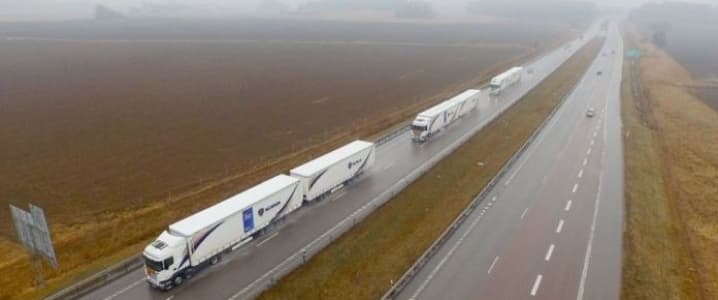How the ELD Mandate Will Improve Fuel Efficiency
In August, R-Squared Energy reported that the U.S. set a new gasoline demand record. We stated that a key reason for this is the growth in population in the U.S. In this article we look at the impact of Hurricane Harvey on gas prices, the current consumption of oil in the U.S., and how a new ruling for commercial vehicles will improve fuel efficiency.
In an article by AOL Finance, it was reported that the consequences of Hurricane Harvey continue to worsen. Aside from displacing tens of thousands of people, gas prices are rising because oil refineries in Texas remain closed. As a result, gas prices have increased to a two-year high, and are expected to keep climbing throughout the U.S. According to the Energy Information Administration, the U.S. consumed a total of 7.21 billion barrels of petroleum products in 2016. That’s roughly a consumption of 19.7 million barrels per day.
The ELD Mandate
While the technology behind solar and wind energy needs more refinement in order to be used on a wider scale, there are quicker, more immediate solutions that some organizations are implementing to reduce the consumption of gas. One government directive is aimed at commercial fleet companies.
Trucking companies make up for more than 500,000 businesses in the U.S., and these companies utilize over 15.5 million trucks on the road. One new law that will come into effect this December is the Electronic Logging Device (ELD) Final Rule by the Federal Motor Carrier Safety Administration (FMCSA).
Related: This Oil Rally May Be Short-Lived
The ELD Final Rule will change how fleet management is operated by requiring drivers to use an app or on-board logging device that’s compliant to the FMCSA’s mandate. Fleetmatics revealed that ELDs will streamline the operating systems of fleet companies, from logging a driver’s hours of service to sending proactive alerts to both fleet managers and drivers if a trucking operation is about to commit a violation.
The ELD Final Rule will improve fuel efficiency because the drivers’ operations will be tracked automatically. Operators will be able to use the data received from an ELD to re-evaluate their routes and potentially find a more efficient route. This will help companies be economic in terms of the fuel they use.
ELD’s will also ensure that drivers work within the allotted amount of Hours of Service (Hos). The device will alert drivers when they are close to violating their HoS, and drivers who go beyond their working hours will be penalized. The FMCSA says that ELDs will save companies around $1.6 billion annually by enhancing fuel efficiency.
Whether or not the ELD Final Rule will be successful or not can only be determined once the law comes in full effect. Will the new mandate affecting millions of trucks operating in the U.S. significantly reduce commercial vehicle gas usage?
By Robert Rapier
More Top Reads From Oilprice.com:
- Tesla Looks To Dominate China’s EV Market
- Are Petrocurrencies Heading For Extinction?
- Will This Trump Move Trigger A Coal And Nuclear Buying Spree?



















http://thefederalist.com/2017/09/13/truck-driver-overregulation-literally-looks-like-government-deciding-work-eat-sleep/
Better yet run all the trucks through Nebraska where it is nice and flat. All you have to contend with in Nebraska is the high winds pushing against your truck. I could be wrong but I think the prevailing wind is out of the northwest..i dont think the wind blows as hard in Nebraska as this story does.
This article is about advertising the unsafe ELD for drivers and make so many drivers quit the industry
I’m astounded with this article. It demonstrates a total lack of research and comprehension with respect to the logistics industry.
First, the vast majority of commercial vehicles use diesel as the main source of fuel—not gasoline.
Second, all the proclaimed “attributes” to ELD has been available to and employed by multiple trucking companies for years. I retired from commercial driving 8 years ago and such systems were employed by almost every major trucking company. “Paper logs” were utilized mostly by smaller trucking operations, but the major trucking companies employed “electronic logs”. In addition, almost every trucking company, even those using paper logs, had “safety and compliance departments” that would review a drivers logs and assess penalties for log violaitons.
Third, with respect to fuel economy and routing, any company needing a computer for routing assignment should not be in the trucking business-plain and simple. Routing programs exist and are used in consort with fueling contracts. Essentially, a trucking company signs a contract with a fuel service company that guarantees the trucking company will “save” on fuel cost by utilizing truck stops the fueling company has under contract. The net result-supposedly-is the contract creates a “win win” situation for the trucking company, the truck stops and, of course, the company offering the service. I plugged in “supposedly” because on a number of occasions the fueling companies “routing” required my driving miles, in one case over 150 miles, out of route to fuel up at a designated truck stop for the sole purpose of maintaining the fuel companies contract.